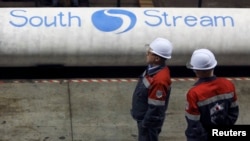Thwarted in one attempt to build a gas pipeline to southeast Europe, the Kremlin is working with a small circle of allies to lay the groundwork for an alternative that would help it maintain leverage in its rivalry with the West.
Russia last year aborted South Stream, a $40 billion pipeline that was to have passed under the Black Sea and via Bulgaria, in the face of objections from the European Union.
With Moscow in financial crisis, it is not clear if its latest plan — a route passing through Turkey, Greece, Macedonia and Serbia, then into Hungary and perhaps on to Austria — will ever come to fruition.
But even if it only exists on paper, it may undermine funding for rival projects and, at a time of heightened tensions over Ukraine, sow division among EU members over the extent to which the bloc should rely on Russia for energy in the future.
A meeting between the Hungarian and Turkish prime ministers on Tuesday was the latest in a flurry of recent contacts between states on the planned route; all have been countries that have kept warm ties with Russia despite the Ukraine crisis.
"Hungary is pursuing an active policy to allow gas to arrive from Turkey, via other countries, through Serbia to Hungary and central Europe,'' Hungary's Viktor Orban said after meeting Turkey's Ahmet Davutoglu.
Davutoglu said Turkey was open to dialogue about funneling Russian gas onward to southeast Europe.
"Volumes need to be discussed, the details of demand,'' he said at a news conference in Budapest.
Supply line vulnerable
Almost all of the natural gas consumed in southeast Europe comes from Russia via Ukraine. But tensions between Kyiv and Moscow, sparked by Russia's annexation of Crimea and the pro-Russian separatist war in eastern Ukraine, make this supply route vulnerable to disruption.
Russia has halted gas flows to Ukraine three times in the past decade: in 2006, 2009 and last year. The stoppages arose from price disputes but drew accusations from the West that Moscow was using energy as a geopolitical weapon.
On Tuesday, Russia's Gazprom again threatened to switch off supplies within days unless Kyiv sent more money, and said transit to Europe could be under threat.
The EU, which as a whole depends on Russia for about a third of its oil and gas, has imposed successive rounds of sanctions on Moscow over its role in Crimea and eastern Ukraine. But it faces a difficult challenge to persuade its 28 nations to keep up the pressure, a task made harder as President Vladimir Putin woos EU members like Hungary with the prospect of plentiful Russian gas on attractive terms.
Diversify, say Washington, EU
Washington and Brussels say the way forward is to diversify supplies: more links to the gas networks of EU neighbors, and terminals that would allow the import of liquefied natural gas from Qatar or, eventually, the United States.
Those solutions would threaten Russia's role as a virtual monopoly supplier to southeast Europe, so the Kremlin urgently needs to find a way to get its gas to the region while bypassing Ukraine.
"Russia has not dropped its political plans to maintain its monopoly on gas'' in the region, said Michael LaBelle, gas expert at the Central European University in Budapest. "There is no doubt that Putin and Orban, working together, will seek to ship gas to the Balkans, Hungary and Austria.''
The planned new pipeline route traces the contours of Russia's surviving friendships in Europe.
Greek Prime Minister Alexis Tsipras, on taking office last month, received the Russian ambassador before meeting any other official; Serbia feted Putin with a military parade and a flyover by fighter jets when he visited Belgrade in October.
Hungary this month became the first EU member in over six months to host Putin for a bilateral visit. Orban used the occasion to say EU states that thought they could get by without Russia were "chasing ghosts.''
Macedonia a bit nervous
Macedonia, too, is in favor of the project, according to a person familiar with official policy on the issue. He said, though, that the government of the former Yugoslav republic was nervous about being caught up in an East-West rivalry: "In a battle between elephants, the ants usually suffer the most.''
Still, doubts linger about the feasibility of the plan.
Russia, cut off from Western capital by sanctions, will struggle to pay for it. The countries on the route are also cash-strapped, and Brussels is unlikely to provide financing. The EU's energy chief has said the Russian idea is economically flawed and in breach of legally binding contracts.
"At the moment, this is just a fairy tale,'' said Attila Holoda, managing director of Hungary-based energy consulting firm Aurora Energy Kft, who considers the scheme a "classic Russian bluff'."
Nevertheless, as long as there is a prospect the route will be built, it will hamper rival projects by creating uncertainty that will make it harder to attract investors to fund them.
Alternative schemes include a gas connector between Greece and Bulgaria, and a project, dubbed "Eastring,'' to connect southeastern Europe to Slovakia's gas network via Ukraine and Romania.





